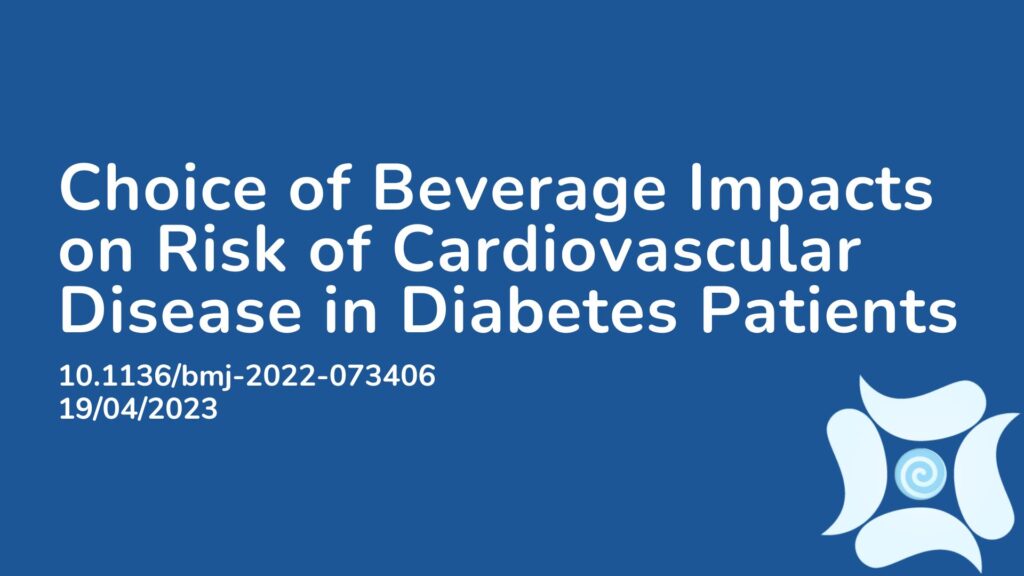Summary:
Over 500 million adults worldwide had diabetes in 2021 and this number is predicted to rise to over 700 million by 2045. The risk of cardiovascular disease, cancer and premature death is increased in adults with type 2 diabetes. This study is a prospective cohort study that looked at the intake of specific types of beverages such as sugar sweetened drinks, coffee, tea and water in relation to cardiovascular disease outcomes and death, among adults with type 2 diabetes. A higher intake of sugar sweetened beverages was associated with a higher risk of death as well as cardiovascular disease, whereas coffee, tea and water consumption reduced the likelihood of death and cardiovascular disease. These findings illustrate that it is not just food we need to be looking at for overall management of conditions such as type 2 diabetes but also our liquid intake in order to reduce comorbidities and death.
Abstract:
Objective: To investigate the intake of specific types of beverages in relation to mortality and cardiovascular disease (CVD) outcomes among adults with type 2 diabetes. Design: Prospective cohort study. Setting: Health professionals in the United States. Participants: 15 486 men and women with a diagnosis of type 2 diabetes at baseline and during follow-up (Nurses’ Health Study: 1980-2018; and Health Professionals Follow-Up Study: 1986-2018). Beverage consumption was assessed using a validated food frequency questionnaire and updated every two to four years. Main outcome measures: The main outcome was all cause mortality. Secondary outcomes were CVD incidence and mortality. Results: During an average of 18.5 years of follow-up, 3447 (22.3%) participants with incident CVD and 7638 (49.3%) deaths were documented. After multivariable adjustment, when comparing the categories of lowest intake of beverages with the highest intake, the pooled hazard ratios for all cause mortality were 1.20 (95% confidence interval 1.04 to 1.37) for sugar sweetened beverages (SSBs), 0.96 (0.86 to 1.07) for artificially sweetened beverages (ASBs), 0.98 (0.90 to 1.06) for fruit juice, 0.74 (0.63 to 0.86) for coffee, 0.79 (0.71 to 0.89) for tea, 0.77 (0.70 to 0.85) for plain water, 0.88 (0.80 to 0.96) for low fat milk, and 1.20 (0.99 to 1.44) for full fat milk. Similar associations were observed between the individual beverages and CVD incidence and mortality. In particular, SSB intake was associated with a higher risk of incident CVD (hazard ratio 1.25, 95% confidence interval 1.03 to 1.51) and CVD mortality (1.29, 1.02 to 1.63), whereas significant inverse associations were observed between intake of coffee and low fat milk and CVD incidence. Additionally, compared with those who did not change their consumption of coffee in the period after a diabetes diagnosis, a lower all cause mortality was observed in those who increased their consumption of coffee. A similar pattern of association with all cause mortality was also observed for tea, and low fat milk. Replacing SSBs with ABSs was significantly associated with lower all cause mortality and CVD mortality, and replacing SSBs, ASBs, fruit juice, or full fat milk with coffee, tea, or plain water was consistently associated with lower all cause mortality.Conclusions: Individual beverages showed divergent associations with all cause mortality and CVD outcomes among adults with type 2 diabetes. Higher intake of SSBs was associated with higher all cause mortality and CVD incidence and mortality, whereas intakes of coffee, tea, plain water, and low fat milk were inversely associated with all cause mortality. These findings emphasize the potential role of healthy choices of beverages in managing the risk of CVD and premature death overall in adults with type 2 diabetes.
Article Publication Date: 19/04/2023
DOI: 10.1136/bmj-2022-073406



